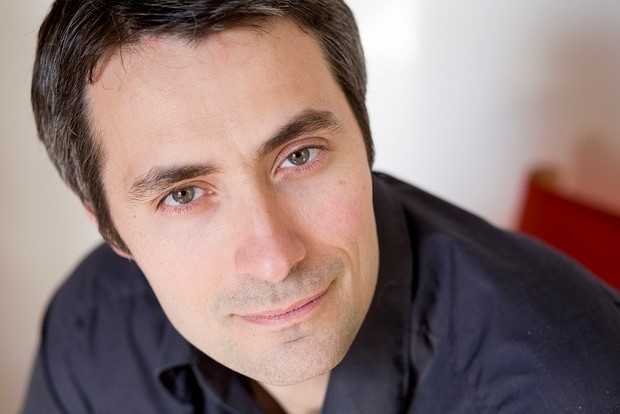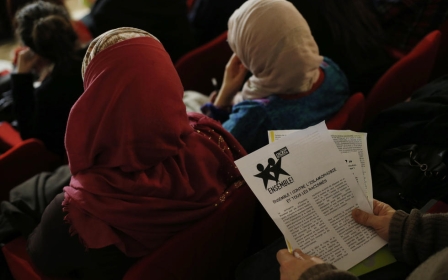INTERVIEW: Raphael Liogier condemns Europe's identity politics of decline

Raphael Liogier, a lecturer at the Political Science Institute (IEP) in Aix-en-Provence and the College International de Philosophie in Paris, is the author of The Suez Complex: The Real Decline of France and Europe, published by Le Bord de l’eau.
In taking another look at history, especially the Suez crisis and its effects on Europe's destiny, Liogier says he is against “self-fulfilling prophesies of ambient declinism”.
With an analysis backed up by documentary evidence and well-reasoned points, he sweeps away the myths linked to the loss of European identity, which act, according to him, as a pretext for the rise of populism across the continent.
The author shows how Europe, and especially France - rejecting globalisation, immigration and Islam - is sacrificing, on the altar of reactionary identity politics, the strategic role that it could play on the international stage.
In a previous work - The Myth of Islamisation (Ed. du Seuil, 2012) - Liogier exposed the fallacies in the theory of a “Muslim invasion” of Europe, suggesting that this “collective obsession” was a symptom of a paranoid turn in Europe that goes beyond Islamophobia.
The French thinker discusses these issues and what they mean in this interview with Middle East Eye.
MEE: In your book Le Complexe de Suez, you talk of a European complex spawned in the aftermath of the Suez crisis of 1956. You argue that Europe, supposedly losing its global dominance after that defeat, fell under siege and lapsed into isolationism. Is this work the sequel to The Myth of Islamisation?
RL: Yes, it is almost the second part of a trilogy that I began with Le Mythe de l’islamisation and which will conclude with The War of Civilisations will not happen. The aim is to counter the declinist discourse about Europe and also to oppose this form of cultural protectionism that drives Europe to look inwards and to hold Islam responsible for its ills. What happened in Suez in 1956 has nothing to do with Islam. [Then-Egyptian President Gamal Abdel] Nasser's concerns were not religious. His fight was anti-colonial.
MEE: So where does this European obsession with Islam, which is more pronounced in France, come from?
RL: Our relationship with Islam is merely a pretext. The hackneyed complaints about the incompatibility of this religion with the values of democracy hide another problem. That is a new type of cultural racism that is fuelled by the fantasy of reverse colonialism. Europe has, in a sense, a complex about a world to which it gave a complex in the past. The people that we colonised, in Algeria, Morocco, Tunisia and so on, are now said to be colonising us, from the disadvantaged parts of our cities, gradually infiltrating our culture in order to adulterate it. If France is more affected by this, it is because of its particular difficulty in managing its colonial past and looking at what it is today, in the light of what it used to be.
MEE: Do you think that Islam and Muslims are paying the price of the humiliation at Suez?
RL: The Suez crisis has nothing to do with Islam. This historic event sealed the fate of the major European powers by marking the end of their dominance in the world. And yet, Suez has been interpreted as a problem caused by Islam. After this conflict, Bernard Lewis, a United States-based academic specialising in the history of Islam, spread the concept of a “clash of civilisations” in 1957, during a conference. In reality, Suez was a show of strength by Nasser, who wanted to assert his anti-colonialism by demonstrating that the Suez canal no longer belonged to the colonisers. This crisis was part of a struggle for decolonisation, not for Islam. Nasser had nothing to do with political Islam.
MEE: One of the main themes of your analysis is the work of Gisele Orebi, who is better known under the pseudonym Bat Ye’or. Her book published in 2005, Eurabia: the Euro-Arab Axis, became a bestseller. You maintain that she put together in the book “one of the most caricatural versions […] of the Muslim plot against the West”. How did her ideas feed Europe?
RL: Eurabia features prominently among European thinkers. Bat Ye’or, or “daughter of the Nile” in Hebrew, was one of thousands of Jews expelled by Nasser after Suez. Viewed – unfairly – as Israeli spies, these families settled in the United Kingdom, France or the United States. They became the main carriers of the idea that Islam wants to surround and crush Europe. Eurabia is part of this paranoid vision of the world.
MEE: Was the grudge of these Jews projected onto Europe's Muslims, who came to be seen as plotters preparing to invade the continent?
RL: According to Eurabia, France sacrificed Israel by allowing itself to be bought off by Arab leaders and petrodollars. But that is not the case at all. France, which suffered a genuine defeat at Suez, stood up for Israel. Here is a concrete example: it contributed its skills and work to enable Israel to become a nuclear power to avenge Suez!
There was a period up until the 1980s when this remained latent because of the Trente Glorieuses ("Glorious Thirty"), when the flourishing economic situation alleviated Europe's sorrow at no longer being the centre of the world. But when mass unemployment emerged, and especially when it started to affect the middle classes on an unprecedented scale, things got more complicated.
MEE: And that gave rise to “Islam bashing” in France, with Muslims being scapegoated?
RL: Yes. But things changed in the 1980s, which was the time when people from immigrant backgrounds began to take matters into their own hands. There were marches for equality and against racism – the so-called “Marche des Beurs” - and it was also a time when these populations became aware that they existed for themselves, outside of the dominant centre. The slang language le verlan appeared as the language of urban estates. Young people re-appropriated the culture that they see the one of their origins.
Alongside that, there was the "veil affair" in 1989 [when two Muslim pupils were expelled from a Parisian high school for refusing to remove their veils in class]. The late 70s and early 80s was also the time of the Iranian revolution and the emergence of Islamic terrorism. All of that added to the climate of social tension, which, combined with unemployment in particular, created a toxic atmosphere in which people started saying “those Muslims are to blame”.
MEE: Issues of identity now dominate public discussion in France. But you think France is mistaken…
RL: The rise of populism and secularism serving identity hygienics has enabled some politicians to win over some of the electorate. In this regard, 2003 was a key year. That was the year that the United States went to war in Iraq. It was a humiliation for Europeans because the Americans went into Iraq without consulting France or Great Britain. It was a first. That showed a real loss of influence of Europe on the international stage.
But the important thing is to look at the underlying strategy of the Iraq war. From 1999, the arrival of the euro was a threat for the United States and oil transactions in dollars. In 2003, 30 percent of worldwide exchanges were in euros. That was a delicate situation for the United States. But France had then other concerns…
MEE: Including secularism and identity, as you explain…
RL: Exactly. Furthermore, in 2003, Francois Baroin, the then-spokesperson for the UMP [Union for Popular Movement], embraced a report entitled “For a new secularism,” which was supposed to address concerns about growing communitarianism. It was mostly about winning voters. But this secularism serves identity hygienics.
With this being the case, we are witnessing a return of intellectuals like Alain Finkelkraut or Eric Zemmour, who portray themselves as defenders of European culture. L’Identité malheureuse by Finkelkraut is a defence of the cultural purity of France. The success of these books confirms the extent to which people do not want to learn when they read a book. What they want, first and foremost, is confirmation of what they feel. What we are seeing at the moment is an obsessive collective fear.
MEE: You think that intellectuals such as Finkelkraut and Zemmour have become the advocates of declinism. Why?
RL: These advocates of declinism, Zemmour and Finkelkraut, exacerbate frustration. Using their Jewishness as a pretext, they present themselves as defenders of European culture in the vein of Bat Ye’or, propagating this idea of Europe being surrounded by Muslims. According to them, they are the people most capable of preserving the purity of European heritage.
Declinism has become the overall mood in Europe, which is nurturing new populist discourses that claim to defend the whole people, whose values, culture and identity are supposedly under attack. People such as Finkelkraut and Zemmour also believe themselves to be on the front line as European intellectuals and as Jewish intellectuals.
Finkelkraut declares, for example, that because he feels solidarity with Israel as a Jew, he knows what it is to be threatened by the Muslim world. For him, it's as if French Muslims were automatically Palestinians on the inside, allies of the Islamic world that aims to take over European culture. To this way of thinking, destroying Israel is merely a first step. Israel would be a European forefront in the Muslim world, a citadel about to fall, heralding the collapse of Europe itself.
This would be a European culture in the sense of a culture of domination. In reality, the real stakes are elsewhere. The dollar has regained its supremacy but Europeans, embodied by Finkelkraut and others, concentrate on the politics of identity. They are the real decline.
This piece was originally published in Middle East Eye's French edition.
New MEE newsletter: Jerusalem Dispatch
Sign up to get the latest insights and analysis on Israel-Palestine, alongside Turkey Unpacked and other MEE newsletters
Middle East Eye delivers independent and unrivalled coverage and analysis of the Middle East, North Africa and beyond. To learn more about republishing this content and the associated fees, please fill out this form. More about MEE can be found here.




